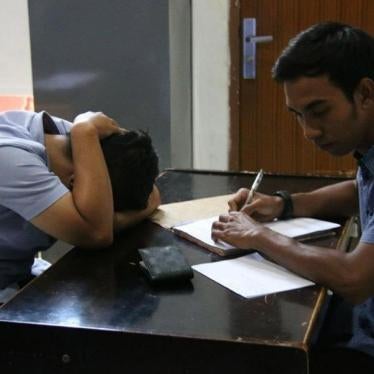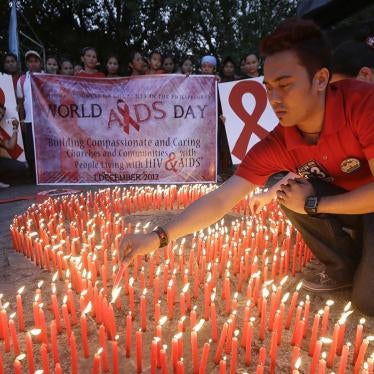Background
Thailand was chosen to host the International AIDS Conference in Bangkok in July 2004 partly in recognition of its achievements in fighting HIV/AIDS. The country enjoys an international reputation as a “best practice” model in the fight against AIDS principally because of its “100 percent condom” campaign the in 1990s. This campaign engaged sex workers with the clear recognition that they were part of the solution to a growing AIDS epidemic.
Drug users have not enjoyed the same recognition in Thailand. Although an estimated 30 percent of new HIV infections in Thailand by 2005 will be among drug users, the government has never sought to provide services to prevent HIV in this population. Thailand is one of only a few countries in the world where syringe exchange—a proven method of preventing blood-borne diseases by allowing drug users to exchange their used syringes for sterile ones—is unavailable. Thailand has an estimated 100,000 to 250,000 injection drug users of which many are heroin users. Opiate substitution therapy using drugs such as methadone is a central element of HIV prevention for heroin users in most countries. But substitution therapy in Thailand is extremely limited. As of early 2004, only 1 percent of Thai drug users were receiving any HIV prevention services—in a country upon which international praise has been heaped for its national AIDS program. As a result, an estimated 40 to 50 percent of drug users in Thailand are HIV-positive. Very few drug users have access to antiretroviral therapy.
The situation of Thai drug users worsened sharply in early 2003 when Prime Minister Thaksin Shinawatra declared a “war on drugs” that gave local authorities and the police free reign, in Thaksin’s words, to deal in a “ruthless” and “severe” manner with persons charged with drug offenses. While the government’s official target was drug dealers, in many jurisdictions both small-scale users and dealers were targeted by the crackdown. Thaksin had run for office on a platform of “prevention and suppression” of narcotic drugs and promised that his anti-drug programs would be humane. But the result of the first three-month phase of the crackdown was some 2,275 extrajudicial killings, which the government blamed largely on gangs involved in the drug trade; an estimated 500 or more deaths occurred in subsequent weeks of the crackdown. In addition, drug suspects were included arbitrarily on “blacklists” or “watchlists” of people targeted for police abuse, human rights defenders were intimidated, and many persons were forced into military-style camps allegedly for drug treatment. Of the deaths that occurred, the government claimed that fifty-one resulted from the police having shot drug offenders “in self-defense”. The government’s claim that most of the deaths resulted from drug gangs having turned on each other has not been verified independently, and the government’s own investigations have been slow and lacking in transparency.
A new voice for the most marginalized
The Thai Drug Users’ Network (TDN) was formed in 2002 by a few drug users who were moved to act by having seen so many of their peers die of AIDS and other drug-related harms. They began by documenting and analyzing the human rights abuses that not only impeded drug users’ access to HIV prevention services and AIDS care but also forced them to live on the margins of society. TDN’s documentation served to mobilize not only new members who sought advice and support from the growing network, but also attention within and outside Thailand to the plight of drug users and the absence of HIV/AIDS and other services for them. The network now has over 100 members and is active in all four regions of Thailand.
TDN did not halt its activities in the face of the drug crackdown that began in early 2003. In April 2003, at a meeting of the International Harm Reduction Association in Chang Mai, Thailand, in spite of the danger to themselves, TDN members organized a peaceful public protest during a presentation by the Thai minister of health. Protestors stood with signs that read “Clean needles save lives” and “50% of Thai drug users = HIV+”. This action helped bring international attention both to the killings in the anti-drug crackdown and to the absence of government attention to HIV/AIDS among drug users.
The grounding of TDN’s work in the reality of drug users’ lives, its cogent analysis of drug policy and human rights issues, and its peaceful methods seemed to impress some policy-makers. Officials of the Ministry of Public Health and the Office of Narcotics Control who had never interacted formally with drug users agreed to meet with TDN and continue to engage with the group on some issues. Among the achievements of this early collaboration was a change in the eligibility criteria for antiretroviral treatment that, in principle, allows drug users to receive ARV therapy, though most drug users still face extreme stigma and discrimination in the health system.
In spite of some collaboration with policy-makers, TDN was unable to persuade the Thai government to include HIV/AIDS services for drug users among the activities proposed in the government’s several applications to the Global Fund to Fight AIDS, Malaria and Tuberculosis. Taking advantage of a Global Fund provision that allows nongovernmental organizations to make their own applications when the official proposals of their government exclude important issues or the concerns of marginalized populations, TDN applied for and won a grant of U.S.$1.3 million to strengthen its policy advocacy work, expand services for drug users, and build the capacity of drug users to advocate for their human rights. When the funds are received, the grant will also enable TDN to raise awareness in the Thai population of the importance of protecting drug users and those around them from HIV, hepatitis, and other illnesses as well as of the reality of drug users’ lives, a key to reducing population misconceptions and prejudices against drug users.
TDN’s work has also revitalized Thailand’s National Harm Reduction Task Force, a body representing government, local and national NGOs, and international agencies, with the mandate to review and recommend improvements for drug policy in Thailand. The Task Force is also active in improving the public’s understanding of drug policy issues and developing technical guidelines for opiate substitution and other programs.
In response to recent criticisms of the anti-drug crackdown, the Thai government has recently pledged to improve both HIV prevention services for drug users and the availability of humane treatment for drug addiction, which has been virtually nonexistent. TDN’s monitoring capacity and its in-depth understanding of the reality of drug addiction in Thailand make it a key player in ensuring accountability of the government with respect to these pledges.
TDN has resisted hierarchy within its organization and has sought to share the burden and credit from its work equally with all members. The Canadian HIV/AIDS Legal Network and Human Rights Watch are proud to confer on all the members of the Thai Drug Users’ Network the 2004 Award for Action in AIDS and Human Rights.








